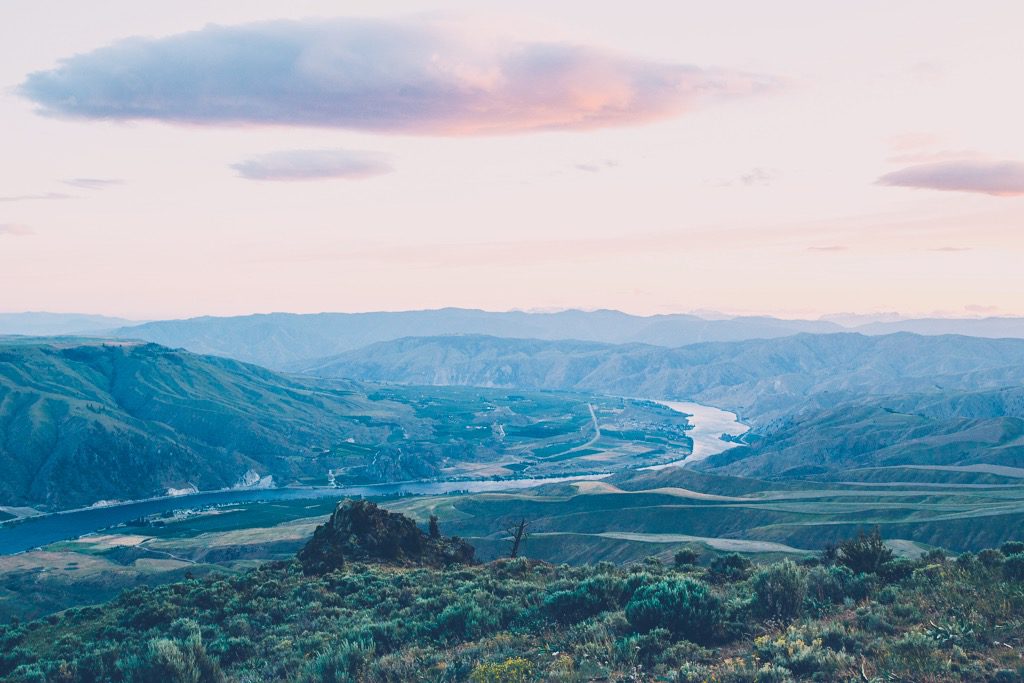Contrary to popular belief, you don’t have to travel to faraway lands to have the mind and heart-opening experiences that travel is often lauded for.
You can have them no matter where you’re currently laying your head at night, even if you happen to call that place “home.”
But what tends to happen after a long trip or a few years of living abroad is that we simply fall back into life as we knew it before our great travel adventure.
We pick right back up with our old habits; we choose the comfortable over the uncomfortable and the known over the unknown.
The magic of travel is that it drives us headfirst into situations that cause us to grow. We’re often uncomfortable, and we’re almost always faced with the unknown.
At home, things are different; we have to actively seek out these situations if we want our personal growth to continue at the same rate we experienced while traveling.
Because at home, we’re surrounded by the familiar. But as long as we’re willing to look for it, that magic we feel when we’re ensconced in a life of travel? It’s always there, just waiting to be discovered.
Home is only familiar if we let it be. If we maintain the same mindset we adopt while traveling and push ourselves beyond the bounds of our comfort, we can discover that very same magic no matter where we are.
We can continue deepening our understanding of the world and blossoming into the people we’re meant to be.
We can stave off that dreaded boredom and begin to redefine wanderlust by discovering the world with our feet planted firmly on the ground.
With diligent practice, we can retrain our eyes to see magic everywhere we go.
The Traveler’s Mindset
Travelers are open to trying new things.
Whenever you’re in a faraway land, trying new things seems like a no-brainer.
Eat these deep-fried crickets? Sure! Go biking at full speed down a huge mountain? Why not! Sample this spiky, smelly fruit you’ve never seen before? But of course!
And yet, this same eagerness to experience the new and foreign has a tendency to wane when you’re in a place that seems familiar, despite plentiful opportunities.
To maintain that curiosity and willingness to expand your horizons is the first step toward feeling the magic of travel no matter where you are.
So try a new recipe, complete a hike you’ve never completed, and visit that new funky shop that just opened up in town. You never know what you’ll find or what you’ll learn about yourself in the process.
As I prepare to transition into a stationary life in my home state, I plan to make trying new things a cornerstone of my daily routine. I’m excited for the possibilities that lie ahead and the unforeseen fruits this practice will bear.
Travelers say “yes” to every opportunity.
If your life at home feels boring, there’s a good chance you are overlooking great opportunities without even realizing it.
Perhaps an old friend you haven’t seen in years wants to catch up over coffee. Maybe a new yoga class was just added to the schedule at your gym, but you’re afraid to go alone. Perhaps there’s live music at your local coffee shop that you’ve always wanted to go see, but you’ve never made the time.
It’s not that you have any good reason to avoid these experiences, it’s just easier–or more comfortable, rather–to say “no.”
These may seem like inconsequential events that there’s no harm in missing, but you never know what you might discover or who you might meet along the way.
Life won’t happen to you; you must go out and grab it. You have to be willing to say “yes.”
Not long ago, I agreed to attend a holiday party where the only people I knew were the hosts. The drive to get there was pretty long, as well. It would have been quite easy to say “no” and blame it on one thing or another; maybe I was suddenly tired that day or I had work that I needed to finish, or any other excuse in the book. I’m so glad I didn’t.
What I found upon arrival was a houseful of welcoming people, and like-minded though we were in many ways, every conversation I engaged in imparted me with something valuable. Life-changing book recommendations, tough questions that caused me to think in new ways, and the unveiling of things I knew in my heart but had never before said aloud.
Get into the habit of saying “yes” more often than you say “no” when unexpected opportunities arise, and I think you’ll find that even more such opportunities begin to present themselves as a result.
Travelers notice the details.
When was the last time you stopped and looked around you in a place that felt intimately familiar? I mean really looked around, taking in the minute details most people so casually and consistently overlook?
Do you know what color the walls are in your favorite restaurant? How are they decorated? Is there music playing? If so, what kind and at what volume?
Do you know the color of your friend’s eyes or whether they take milk in their coffee? Do they have dimples? Do the corners of their eyes crinkle when they smile?
Just the other day, I caught myself admiring dust particles as they danced through the air, suspended in the beams of late afternoon sunlight that poured into the room. It was hardly the first time I’d witnessed this phenomenon, but it was likely the first time I’d paid it much attention.
These particles drifted so slowly, so gracefully, each one on its own unique path. The way the light reflected off of them made them shine like tiny suns, burning brightly in their own little universe.
It was a perfect, magical moment shrouded in calm and a profound feeling of presence. I couldn’t help but smile at the heartfelt joy I experienced upon noticing such a commonplace thing whose beauty I suddenly could not ignore.
It is this appreciation of the everyday occurrences we take for granted, this ability to see beauty in things not considered conventionally beautiful, that helps us develop mindfulness and gratitude anytime, anywhere.
To practice noticing the details in your own life, here is something you can try today: Watch the sunset this evening and describe the experience in vivid detail. Notice as the colors change from minute to minute; notice whether you see any clouds or birds or if you feel the temperature changing. Have the stars come out yet? How many?
Write your observations down in a journal, or simply say them out loud to a friend.
Travelers learn by doing.
When you’re in a foreign country and you need to get from point A to point B, there’s no time to hesitate just because you’re not quite sure how to do it. You just show up at the bus station and hope for the best.
It almost always works out the way you want it to, and if it doesn’t, well, you’ve learned a lesson and now you have a great story to tell.
When I’m navigating a new city’s public transit system for the first time, I ALMOST ALWAYS take it in the wrong direction at least once. I’m not kidding. I’ve done it in London. Berlin. San Francisco. Bangkok. Medellín.
Of course, I always figure it out eventually. When learning by doing, there are bound to be some mistakes–but I’m still learning faster than those who are too scared to try.
In reality, this method of figuring things out as you go will help you in all areas of your life. You’ll rarely know ahead of time how to achieve your goals, but that hardly means you shouldn’t try anyway.
Travelers go out of their way to meet new people.
The experiences that we have while traveling are certainly wonderful, but it’s the people we meet and the interactions we share with them that are often what we remember years down the road.
It’s impossible to really understand a new place without understanding its people and what makes them tick. In my opinion, interacting with locals is the most important part of travel.
It’s what teaches us new perspectives and forces us out of tired old ways of thinking. It’s how we learn compassion for those who are different from us.
The very same thing is true at home. How well do you really know the people in your home city? How well do you really know your neighbor?
How often do you engage in conversations with people whose opinions differ from your own, or who have had vastly different experiences?
You are guaranteed to learn, grow, and gain new perspectives by talking to people while you’re at home, just as you would while traveling.
And there’s no need to be selective here–if Humans of New York has taught us anything, it’s that everyone has a story to tell. Everyone has a something to teach us.
So the next time a stranger strikes up a conversation with you, make it a point to engage with them rather than retreat. For the introverts among us, this will feel particularly uncomfortable.
Good. That is precisely the point.
How do you maintain a traveler’s mindset when you’re at home? I’d love to hear your ideas in the comments.
This post contains affiliate links, meaning I may earn a small commission if you make a purchase, at no extra cost to you. Thank you for supporting The Sweetest Way!



